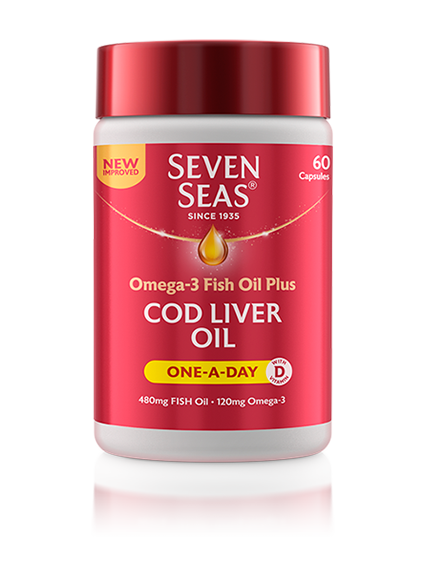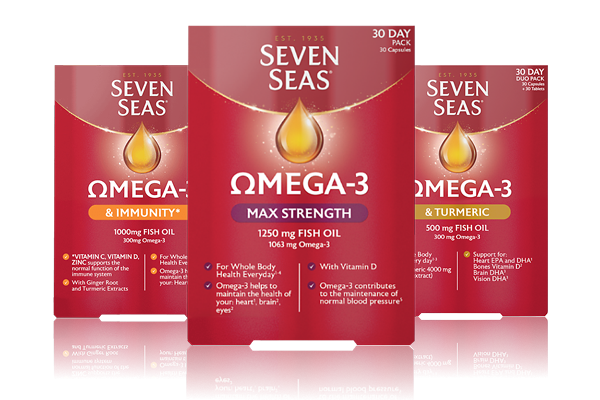Vitamin D is a fat-soluble nutrient that contributes to healthy bones, strong teeth, and supports the functioning of the immune system.
Jump to:
Vitamin D is a fat-soluble nutrient that contributes to healthy bones, strong teeth, and supports the functioning of the immune system. It also helps our muscles function properly and aids in the absorption of calcium and phosphorus in our bodies. Vitamin D is often called 'the sunshine vitamin' because it is produced when a precursor compound within our skin reacts with UVB radiation from sunlight. But unless we spend time in the sun, most of us probably don't get enough of it on a daily basis & very little between October and March as the sunlight doesn’t contain enough UVB radiation, so it is better to rely on food and top up with supplements.
Vitamin D benefits
Regardless of age, vitamin D is needed for the maintenance of normal bones, because it helps the body absorb calcium and phosphorus. It supports the proper functioning of muscles. It also aids in the process of cell division, which helps our bodies grow and repair themselves. Vitamin D contributes to the normal functioning of the immune system, which is the body's natural defence against germs and harmful bacteria. 4
Vitamin D natural food sources
Fortified Foods
Certain foods we eat in the UK are now fortified with vitamin D. These include milk, yoghurt, margarine, orange juice and breakfast cereals.
Oily Fish
Fish rich in omega-3 fatty acids are also good sources of vitamin D. Opt for oily fish like mackerel, salmon, trout and sardines at least once a week for it to benefit your health.
Canned Fish
A simpler and less expensive option than fresh oily fish is a canned version such as tuna or sardines, which both contain vitamin D as well as heart healthy fatty acids EPA and DHA. The beneficial effect for the heart is obtained with a daily intake of 250 mg of EPA and DHA.
Egg Yolks
Eggs are a straightforward way to get vitamin D as they are popular in many breakfast, lunch, and brunch dishes. It is the yolks that contain the vitamin, so use the whole egg when incorporating into your dishes.
Liver
Beef liver is a reliable source of vitamin D, vitamin A and iron, making it a good all-round option for getting more vitamins into your diet.
Why Do We Need Vitamin D?
Vitamin D helps contribute to healthy bones, teeth, muscles and our immune systems1. In the UK, from April to September, our bodies should be able to create all the vitamin D we need from the sunlight on our skin. However, from October to March, the weaker sunlight does not have enough UVB Radiation to allow for vitamin D production1 and this is when we need to turn to food and supplements for a boost.
Vitamin D – especially recommended for…
People who spend a lot of time indoors
People with darker skin tones
People with milk allergies or lactose intolerant
People who live in areas that do not get a lot of sun
Breastfed infants
Children under 5 years
Pregnant & breastfeeding women
Supplements
Despite eating the right foods and spending time in the sun, it can be difficult to get enough vitamin D from sunlight and food alone. Public Health England recommends that everyone in the UK over the age of 4 considers taking a daily supplement with 10 µg of Vitamin D to ensure they get the vitamin D needed during the autumn and winter months2. Children aged 1 to 4 years should have a daily 10 microgram vitamin D supplement all year round. Public Health England also recommends that babies are exclusively breastfed until around 6 months of age, as a precaution, all babies under 1 year should have a daily 8.5 to 10 µg vitamin D supplement to ensure they get enough. Children who have more than 500ml of infant formula a day do not need any additional vitamin D as formula is already fortified3. Seven Seas Cod Liver Oil One-A-Day capsules contain vitamin D, hence a significant source of vitamin D for you to obtain the above listed health benefits – they are also rich in Omega-3 which plays a significant role in maintaining good health.
DID YOU KNOW?
The practice of fortifying milk with vitamin D was started in the United States in the 1930s. It was an effort to eliminate rickets, a bone-weakening disease that was prevalent at the time among many children. Milk was chosen due to its wide availability and richness in calcium.
References:
nhs.uk. 2020. Vitamins And Minerals - Vitamin D. [online] Available at: https://www.nhs.uk/conditions/vitamins-and-minerals/vitamin-d/ [Accessed 9 November 2020].
GOV.UK. 2016. PHE Publishes New Advice On Vitamin D. [online] Available at: https://www.gov.uk/government/news/phe-publishes-new-advice-on-vitamin-d [Accessed 9 November 2020].
GOV.UK. 2018. SACN Publishes 'Feeding In The First Year Of Life' Report. [online] Available at: https://www.gov.uk/government/news/sacn-publishes-feeding-in-the-first-year-of-life-report#:~:text=SACN%20recommends%20babies%20are%20exclusively,change%20to%20current%20government%20recommendations. [Accessed 9 November 2020].
https://efsa.onlinelibrary.wiley.com/doi/epdf/10.2903/j.efsa.2010.1468

hero product
Our Cod Liver Oil One-a-day product comes in the form of an easy to consume, single capsule dosage for those important health benefits we need every day. It contains 120 mg of Omega-3 plus the government recommended, 10 μg Vitamin D.




